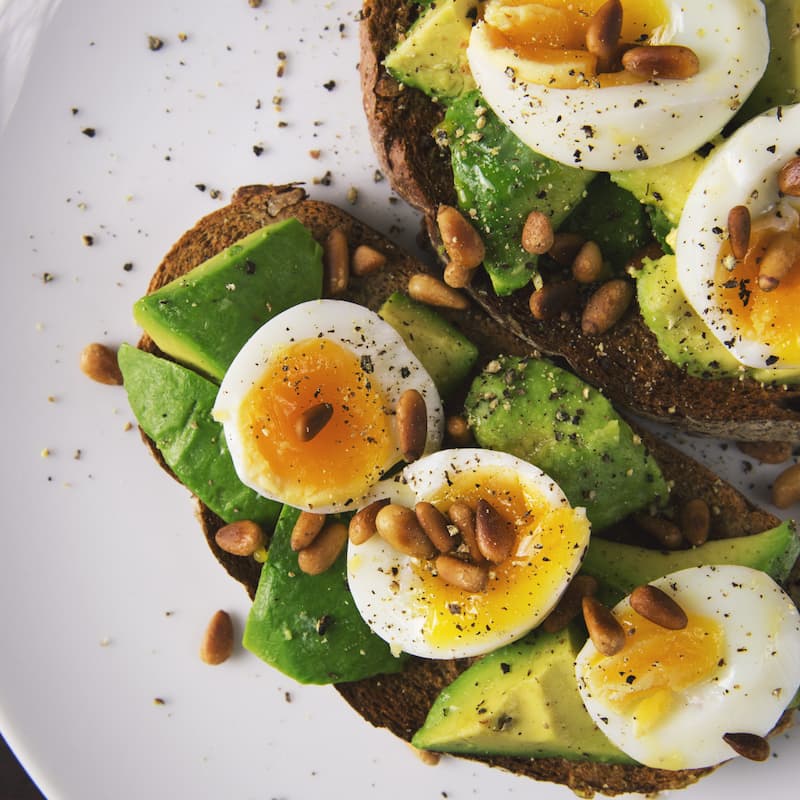Culture Shock: The Sweet American Morning
Arriving in America at 25, I was struck by the country’s sweet tooth. Breakfast time was a sugar-fest, with pancakes, waffles, and syrup-drenched cereals taking center stage.
It was a far cry from the savory beginnings I was used to, and it got me thinking:
Why do we treat breakfast so differently from lunch or dinner?
In Asia, the lines between breakfast, lunch, and dinner blur. There’s a rhythm to the kitchen, a symphony of chopping, boiling, and sizzling that begins at dawn.
It’s a labor of love, where moms wake up at 5AM to prepare the day’s first meal. This practice might sound strange to the bustling American lifestyle, but it’s a testament to the importance of a nutritious, balanced start to the day.

Sugar-Coated Deception: The Truth About “Healthy” Breakfast Choices
Sadly, the convenience of ‘pour-and-eat’ cereals and ‘healthy’ yogurts has led us down a sugary path. The happy cartoon characters on the packaging hide a bitter truth – these foods are laden with added sugars.
The American Heart Association warns us that we are consuming five times the allowable sugar intake daily. It’s time to rethink our choices and veto sugary breakfasts.
American adults consume an average of 17 teaspoons of added sugar every day. This is a startling figure, especially when contrasted with the recommended daily limits: 6 teaspoons for women and 9 for men. We are consuming more than two to three times the advised amount of sugar every single day.
To understand the gravity of this situation, consider this: A single grande caramel macchiato from a popular coffee chain contains 33 grams of sugar, equivalent to about 8 teaspoons.
This means that one indulgent morning coffee could potentially account for more than your entire daily sugar allowance, particularly if you’re a woman.
Suddenly, that sweet morning pick-me-up seems a lot less appealing, doesn’t it?
It’s clear that our consumption of added sugars, especially during breakfast, needs to be reconsidered. It’s time to move away from the sugar-coated deception of many breakfast choices and towards healthier, more balanced options.
Redefining the Morning Meal: Exploring Healthier Breakfast Options
Forget those sugar-packed usuals, and let’s dive into some delicious, better-for-you ways to start your day.
Dinner for Breakfast
In our busy world, the idea of cooking a full meal first thing in the morning might seem almost laughable. Who has the time?
However, there is a way to enjoy the benefits of a hearty, nutritious breakfast without the early morning hustle in the kitchen: the approach I like to call “Dinner for Breakfast.”
“Dinner for Breakfast” is a simple and practical strategy. It involves cooking a larger portion of your evening meal and setting aside a portion for the following morning.
This idea might sound strange, especially if you’re used to a bowl of cereal or a piece of toast for your first meal of the day. But it offers a healthy, time-saving alternative to those sugar-laden breakfast options that have become all too common.
Imagine waking up to a plate of grilled chicken with a side of mixed vegetables, or a portion of hearty lentil soup, or even a slice of last night’s casserole. These are meals that provide a balance of lean proteins, complex carbohydrates, and healthy fats.
They’re designed to give you a steady release of energy throughout the morning, keeping you full and focused.
The “Dinner for Breakfast” approach also offers flexibility. Not a fan of eating a large meal in the morning? No problem. Simply adjust the portion size to your liking. The point isn’t to make breakfast the largest meal of the day, but rather to ensure it’s a nutritious one.
Of course, this doesn’t mean you have to eat dinner leftovers every morning. There’s still room for traditional breakfast foods. The key is to focus on whole foods that provide good nutrition, rather than reaching for the quick, often sugar-filled options that offer little in terms of health benefits.

The Farmer’s Breakfast
If you’re not a fan of dinner for breakfast, let’s turn back time and revisit the traditional American Farmer’s breakfast.
Before the sugar industry sweetened our plates, farmers recognized the importance of a hearty start. They ate whole foods: eggs, meats, steel-cut oatmeal, and fruits. No added sugars, no artificial flavors – just good, honest food.
A Farmer’s Breakfast typically includes a balance of proteins, complex carbohydrates, and healthy fats. Think eggs, whole-grain toast, fresh fruits, and perhaps a side of lean meat or beans. Not only is this kind of meal satisfying, but it also packs a serious nutritional punch, giving your body an excellent start to the day:
- Eggs: Packed with high-quality protein and essential nutrients like Vitamin B12 and selenium, eggs help you feel full and energized. They’re also versatile, allowing for a variety of cooking methods to suit your taste.
- Whole Grains: Items like whole-grain toast or oatmeal provide complex carbohydrates, which offer a slow and steady release of energy. They also contribute dietary fiber, which supports digestion and can help control hunger later in the day.
- Fresh Fruits: Fruits add a burst of sweetness to your breakfast, along with a host of vitamins, minerals, and antioxidants. Try adding seasonal fruits to your meal for variety and optimal nutrition.
- Lean Meats or Beans: For an extra protein kick, consider adding a side of lean meat like turkey or chicken. If you’re vegetarian or simply prefer a plant-based option, beans can be a great alternative, providing both protein and fiber.
By not skipping on any food group and focusing on nutrient-dense options, a Farmer’s Breakfast can help you kickstart the day on a high note. It’s a meal that’s designed to sustain you, keeping your energy levels stable and your hunger at bay until lunchtime.
Simple Keto Breakfast Muffin
The Keto diet, high in fats and low in carbs, has gained popularity for its potential health benefits, including weight loss and improved brain function. A Keto-friendly breakfast can be a fantastic way to start the day, providing essential nutrients without the sugar overload.
Here’s a simple, delicious, and satisfying recipe for a Keto Spinach Muffin that can be prepared in advance, perfect for those busy mornings:
Ingredients:
- 2 cups of almond powder: A great source of protein and healthy fats.
- 4 large eggs or 8 egg yolks only: Packed with protein to keep you feeling full.
- ½ cup unsalted butter, melted: A source of healthy fats.
- ¼ cup heavy cream: Adds richness and flavor.
- 3 tbsp unsweetened almond milk (optional): To adjust the batter’s consistency.
- 1 cup cheddar cheese, shredded or parmesan cheese, grated: Provides calcium and a savory kick.
- ⅓ cup bacon, crumbled: Adds a smoky flavor and some extra protein.
- 4 cherry tomatoes: Packed with vitamins and antioxidants.
- ¼ cup red onion, chopped: For a bit of crunch and sweetness.
- 1 cup of fresh spinach, chopped: A superfood packed with vitamins and minerals.
- 1 tsp baking powder: To help your muffins rise.
- ½ tsp garlic powder, salt, pinch of pepper: For seasoning.
To prepare, simply combine all the ingredients in a large bowl, mix until well-combined, then spoon into a greased muffin tin. Bake at 350°F (175°C) for 20-25 minutes, or until golden brown and set.
These muffins can be stored in the refrigerator and reheated as needed, offering a convenient, healthy, and delicious alternative to traditional high-sugar breakfast options. A perfect way to rise, shine, and conquer the day!
Quenching Your Thirst: Healthy Breakfast Beverage Choices
Along with choosing a nutritious food option for breakfast, it’s also important to consider what you’re washing it down with. Here are some suggestions for healthy breakfast beverages:
- Water: Starting your day with a glass of water is a good habit that promotes hydration. It’s simple, refreshing, and calorie-free.
- Black Coffee with Nut Milk: If you need a caffeine boost to start your day, a cup of black coffee might be a good choice. To make it a bit creamier without adding too much sugar, consider adding a splash of unsweetened nut milk, such as almond or cashew milk.
- Orange Juice: Orange juice, particularly blood orange juice, is rich in compounds like hesperidin, narirutin, carotenoids, hydroxycinnamic acids, and anthocyanins.
These components have been shown in epidemiological studies to potentially decrease cardiovascular risk, making orange juice a popular breakfast item in America.
A randomized controlled trial has shown that after just 2 weeks of blood orange juice consumption, there can be an increase in Nitric Oxide bioavailability, which improves the function of endothelial cells. This was measured by a 2.01% increase in blood vessel dilation.
While these beverages can form a part of a balanced breakfast, it’s always best to consume them in moderation as part of a varied and balanced diet.

Embracing the Breakfast Revolution: The First Step to Healthier Mornings
Remember, a good breakfast is more than just fuel for the day—it’s a chance to nourish your body and set a positive tone for the hours ahead.
Keep exploring — and more importantly — keep making your breakfast a nutritional powerhouse. After all, a great day starts with a great breakfast.
Here’s to your health and happiness, one morning at a time!


